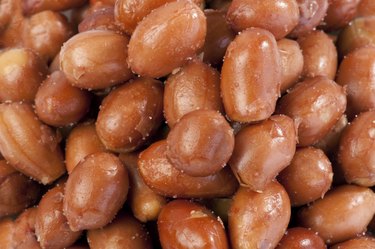
If you like eating peanuts, you'll probably have realized there are a variety of different types of peanuts at the grocery store. Spanish peanuts, which are sometimes known as redskin peanuts, are one of the most popular types.
Tip
Roasted and raw Spanish peanuts are good for you for different reasons. Roasted peanuts may have more vitamin B2 and antioxidants if they have their skin on, but tend to have salt added. Raw peanuts typically have more thiamin and are usually sold without any added sodium.
Video of the Day
Video of the Day
Consuming Redskin Peanuts
According to the National Peanut Board, there are four main types of peanuts that you're likely to find at your local supermarket. These are known as Runner, Valencia, Virginia and Spanish peanuts. Spanish peanuts also go by the name redskin peanuts, as their outer layer has a noticeable red color.
Spanish peanuts are known for having a distinctive, nutty flavor which is enhanced further after roasting. They're commonly used to make peanut candy, like peanut brittle or peanut butter. However, you can find roasted, salted or raw Spanish peanuts sold, too.
All peanuts, including redskin peanuts, are considered to be a type of healthy food. The American Heart Association recommends consuming them, as they are rich in a variety of essential nutrients, including protein, dietary fiber, antioxidants, vitamins and minerals.
Peanuts are often grouped together with nuts, but the Cleveland Clinic says that they're actually a legume. Both the American Heart Association and Cleveland Clinic recommend consuming between an ounce and an ounce and a half of peanuts or other nuts on a regular basis. An ounce is the equivalent of about 35 peanuts.
Ingesting about five ounces per week (of various types of nuts, not just peanuts) can be great for your health. A March 2019 study in Circulation Research reported that these foods can benefit your cardiovascular health.
However, it's important to incorporate a variety of different nuts into your diet. Although peanuts are good for your health, another study from Circulation Research published in February 2019 reported that tree nuts like walnuts, hazelnuts, almonds and pecans have a wider range of benefits.
Read more: 9 Healthy Nuts That May Help You Live Longer
Roasted vs. Raw Spanish Peanuts
Peanuts are often processed in a variety of different ways. Processing tends to enhance their flavor and can improve shelf life, says a September 2016 study in the LWT - Food Science and Technology Journal.
Whether you're consuming raw Spanish peanuts or roasted ones, you'll be able to obtain various different essential vitamins and minerals from each serving. The USDA says that peanuts contain B-complex vitamins and vitamin E, along with minerals like iron, potassium, magnesium, phosphorus, copper, zinc and manganese.
There isn't much difference between roasted and raw Spanish peanuts. However, a June 2018 study in Applied Biological Chemistry reported that roasting may change the amounts of certain nutrients in your peanuts. In this study, levels of thiamin (vitamin B1) were reduced because of the roasting process.
However, the same study reported that riboflavin (vitamin B2) content increased due to the roasting process. A January 2016 study in the _Journal of Food Science and Technology _reported that the antioxidants found in peanut skins may increase due to the roasting process, too.
As you can see, roasted and raw Spanish peanuts can benefit your health in different ways. However, roasted peanuts are usually also salted.
The Harvard T.H. Chan School of Public Health says that most people consume too much sodium each day, so it is likely best to consume raw Spanish peanuts. Alternatively, roast Spanish peanuts at home so that you can make sure that no extra salt has been added.
- Harvard T.H. Chan School of Public Health: "Salt and Sodium"
- USDA: "Nutrition Comparison of Raw Peanuts vs Redskin Spanish Peanuts vs Roasted Spanish Peanuts"
- Applied Biological Chemistry: "Comparison of the Retention Rates of Thiamin, Riboflavin, and Niacin Between Normal and High-Oleic Peanuts After Roasting"
- Journal of Food Science and Technology: "Peanuts as Functional Food: A Review"
- National Peanut Board: "Peanut Types"
- Cleveland Clinic: "Nutrition: Nuts and Heart Health"
- American Heart Association: "Go Nuts (But Just a Little!)"
- Circulation Research: "Nut Consumption in Relation to Cardiovascular Disease Incidence and Mortality Among Patients With Diabetes Mellitus"
- Circulation Research: "Nuts, Cardiovascular Health, and Diabetes Will a Nut a Day Keep the (Heart) Doctor Away?"
- LWT- Food Science and Technology: "Characterization of Peanuts After Dry Roasting, Oil Roasting, and Blister Frying"
- EPA: Peanut Processing
- Sharcare; Are Roasted Nuts Just as Healthy as Raw Nuts?; Dr. Mehmet Oz